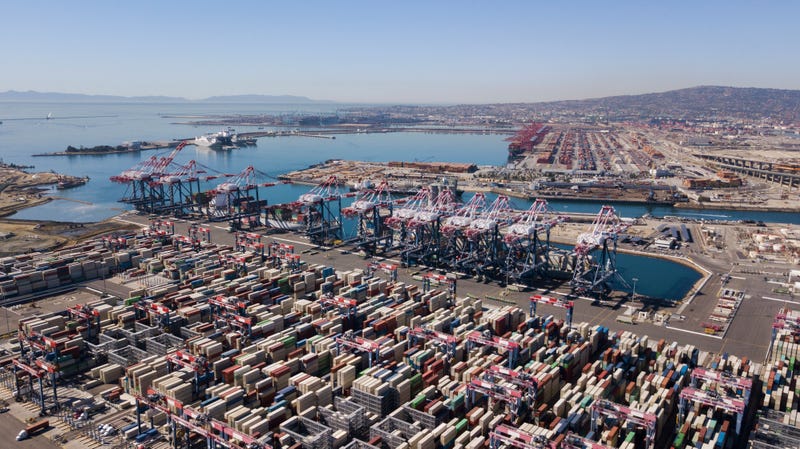
LONG BEACH, Calif. (KNX) - The largest terminal at the Port of Long Beach unexpectedly closed Monday after a weekend of worker shortages, which are suspected to be an unofficial labor action amid union negotiations.
Total Terminals International, which operates the terminal, sent notices to truckers on Sunday that it would be closed for both the day and night shifts Monday, according to an email obtained by CNBC.
The sudden shutdown comes after dockworkers failed to report for work last weekend, effectively shutting down operations at the ports of Long Beach and Los Angeles.
While the International Longshore and Warehouse Union hasn’t called an official strike or work stoppage, some speculate that the absences are related to the union's contract negotiations with the Pacific Maritime Association, which have dragged on for more than a year.
The apparent work slowdown began on Friday, when ILWU members didn’t report to work at the ports of L.A. and Long Beach. “Dailies” — the workers who fill in on the schedule — also failed to show up to work over the weekend.
On Friday, PMA claimed the ILWU was “staging concerted and disruptive work actions that have effectively shut down operations at some marine terminals.”
ILWU released a statement that afternoon, which didn’t directly address the labor shortage, but reiterated that “The ILWU is committed to bargaining a contract that is fair and equitable, including wages and benefits that reflect the dedication of the ILWU workforce and its contributions to the shipping industry’s success.”
“Any reports that negotiations have broken down are false,” International President Willie Adams said in the statement.
The ILWU's previous agreement with the PMA expired on July 1, 2022. Since then, longshoremen have been working without a contract while trying to negotiate a new collective bargaining agreement.
In recent months, periodic actions and shutdowns have occurred at ports up and down the west coast, including an alleged 24-hour shutdown at the ports of L.A. and Long Beach in April.
“This is very contentious, these negotiations, and I don’t think one side wants to rub the other side the wrong way,” Matt Schrap, CEO of the Harbor Trucking Association, told KNX News.
According to Schrap, the terminal claimed Monday’s closure was due to cargo volume, not labor issues. But while he says there’s no way to know for sure, he did raise the possibility that the shutdown and union negotiations are interconnected.
“They said they’re not going to strike. Now, will there be disruptions and slowdowns to try to get the point across? I feel like we’re experiencing that,” he said.
The ports of L.A. and Long Beach together handle around 40% of all inbound cargo containers for the entire United States. Disruptions due to the labor dispute on the west coast have caused some companies to reroute goods to other ports.
Gigi Moreno, senior economist for the Southern California Association of Governments, says that a quick resolution to the labor dispute could reverse this trend and avert any serious impacts on the supply chain.
“There’s a strong chance that if this is not a continued dispute, if this is a short dispute, there’s a strong chance that after an agreement is reached and normal operations resume, much of the business that has been diverted in recent months will eventually return to southern California,” Moreno said.
But Jock O’Connell, an international trade adviser at Beacon Economics, warns that ongoing disruptions may do irreparable damage to the ports’ business — which could have broader effects for southern California.
“The real impact on the regional economy will be more long term, and that has to do with the reputation of the two ports as being competitive gateways for international trade,” said O’Connell. “The ports and the labor problems that the ports have encountered do not bode well for the image in the eyes of shippers.”
KNX News reached out to the ILWU and PMA for comment, but didn’t receive a response.
Follow KNX News 97.1 FM
Twitter | Facebook | Instagram | TikTok


